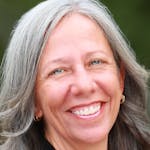Blood tests and CT scans, 911 calls. Anguished moments in ICU wards. Hushed discussions with clinicians of every stripe. When our oldest son was diagnosed with a genetic disorder in 2003, my wife and I were beamed into an alien, frightening world, one with its own language and rules and moving targets. Our quest to pinpoint a mutation on a gene called SMN1, located on chromosome 5, meandered for almost a year, ravaging us emotionally, walling us off from work and friends.
In her crisply written, deeply informed memoir, "The Family Gene," Joselin Linder captures the dread and fatigue that accompanies such an odyssey, how it ripples out to engulf multiple branches of a family.
In the early 1990s, while Joselin and her older sister were still teenagers, her father, a physician in Ohio, complained of swollen ankles. More ominously, his lungs filled with chyle, a buttermilk-like fluid secreted from lymph nodes, baffling his own doctors. Despite a revolving door of hospitalizations and desperate, I'll-try-anything treatments, Bill Linder succumbed in 1996, months shy of his 50th birthday, a fate eventually shared by two other male relatives.
But the Linder women were also affected. Joselin had grown up with the tale of her great-grandmother Mae, a Brooklyn Jew who suffered the same symptoms as Bill, as did her daughters — swollen feet, labored breathing, chyle draining into organs.
The women's symptoms were milder, and they lived longer, spurring a Harvard geneticist, Christine "Kriket" Seidman, and her lab to suspect a glitch on the X (or sex) chromosome — women with a mutation could rely on their second X to ameliorate the threat.
Linder evokes the twists and turns of Seidman's yearslong investigation with a wry wit and flair, depicting X as "the Marilyn Monroe of chromosomes — Norma Jeane, to those who didn't know what she could become with a little red lipstick and a lot of peroxide."
One of Seidman's colleagues eventually maps the mutation. Armed with an answer, Linder marches forward, with her customary spunk, into the arena of personalized medicine, determined to rescue herself and other afflicted loved ones.
Like any memoir, "The Family Gene" detours into details of the author's personal life. Linder occasionally indulges herself with vexing romances and beer-soaked misadventures as she roams from city to city after her father's death. Less might have been more here.
But her underlying insight is revelatory: For those of us whose lives are circumscribed by our caregiver roles, we don't just shed who we are in the name of duty. It's not our job to inspire. We're still the same people — passionate, ornery, big-hearted, selfish — but with an added facet that we hope makes us better humans.
"The Family Gene" nails this truth in a clear, honest voice, an invaluable addition to the literature that dramatizes severe illness and its impact.
Hamilton Cain is the author of "This Boy's Faith: Notes From a Southern Baptist Upbringing," and a former finalist for a National Magazine Award. He lives in Brooklyn.
The Family Gene
By: Joselin Linder.
Publisher: Ecco, 261 pages, $28.99.





